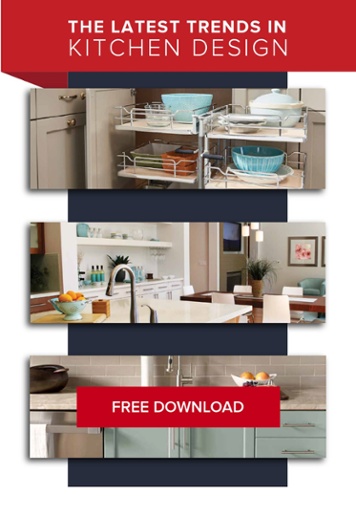There is a lot that happens in a kitchen that can cause damage to wood. So, one might assume that hardwood flooring wouldn’t be the best choice for a kitchen. Surprisingly though, hardwood floors, when sealed and cared for properly, work well in kitchens and can be a great option.
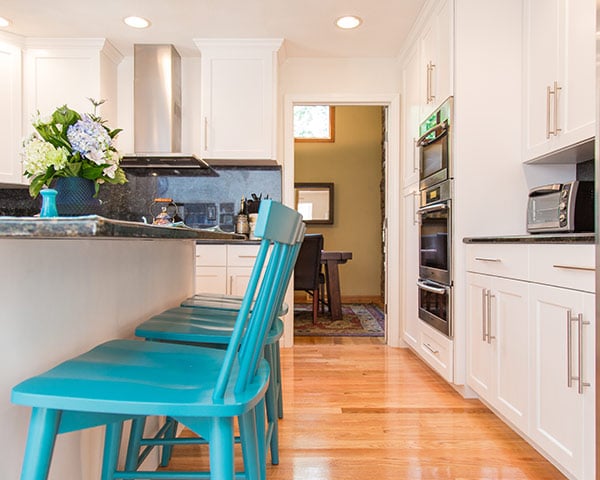
Yes, they are prone to water damage and plank hardwood flooring requires sanding and refinishing every decade or so, but they'll last the duration of a home's lifetime if they are properly maintained. That being said, they do need to be taken care of, which is why hardwood flooring isn't for everyone.
Deciding if Wood Floors are Right for Your Kitchen
Hardwood floors are beautiful and work with any design style. If you're in the process of remodeling a kitchen with existing hardwood floors, we recommend keeping them unless you’re dead-set on replacing them with tile or an equally durable selection. If you’re not remodeling, but simply considering new floors for your kitchen, weighing these pros and cons will help you decide if hardwood is the way to go with your kitchen’s flooring.
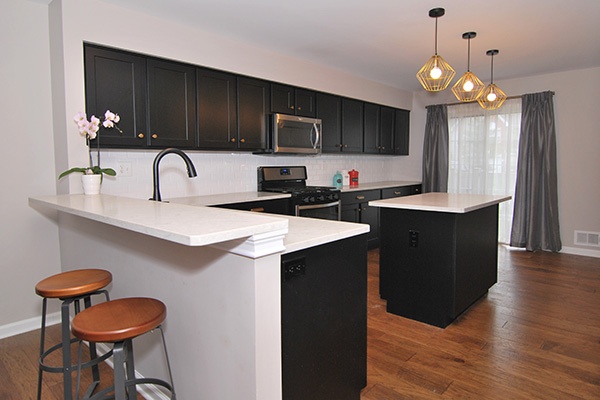
The pros of hardwood kitchen flooring
First, we'll start with the positive aspects of choosing wood flooring for your kitchen.
Beauty
Natural wood is gorgeous, and the variety of color and wood grain patterns mean there's a hardwood type for everyone. If you have a particular color in mind, be mindful that some woods take stain better than others. If you're interested in sanding the floors and refinishing them to a color that better coordinate with your kitchen, you'll want to pay close attention to samples, and test different stains to ensure it looks the way you want it to when the project is complete.
Durability
Water is a hardwood plank's worst enemy. Water damage will cause a plank to warp and/or split. For this reason, many homeowners question whether wood is durable enough to be a good flooring choice. In truth, tile or concrete are the most water-resistant flooring options, but wood is a close second/third. A spill or puddle that is mopped up quickly will never cause a problem. It's standing water, or an unresolved leak, that will cause a level of damage that would require a replacement.
When it comes to durability, look for wood species that rank high on the Janka hardness chart. Check out this Wood Flooring Hardness Chart from the National Wood Flooring Association to learn more.
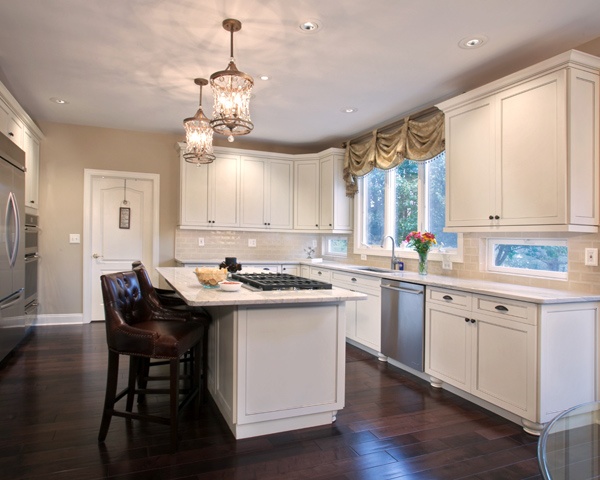
Versatility
As mentioned in the Beauty section, wood is very versatile. It is just as happy in a contemporary or modern kitchen design as it is in a traditional farmhouse kitchen remodel.
Softer & Warmer Than Tile
If you're trying to choose between keeping an existing hardwood floor or replacing it with tile, texture should be a consideration. Tile is colder and harder than wood, but that’s nothing that a few strategically placed area rugs can't fix.
The cons of wood floors in the kitchen
Of course, no product is perfect. These negative characteristics may lead you to skip hardwood altogether, or even replace your kitchen's existing hardwood floors with something else.

Cost
Wood floors are expensive. Uninstalled wood planks run between $4 and $12 per square foot. They also have some of the highest labor costs because they must be meticulously sanded and finished onsite.
Vulnerability
Yes, a well-maintained hardwood floor will last for more than a century. However, they are prone to denting and scratching - especially if they're a softer wood species, like fir or yellow pine. Then, there is the aforementioned sensitivity to water. If you live in busy household - or in one that easily disregards the need for immediate spills or leaks - wood may not be the best option. Once a section of hardwood warps, splits or molds, the entire section must be ripped out and replaced.
Maintenance
In order to keep wood looking its best, and protecting it from wear-and-tear, it should be sanded and refinished on a 10-year or so basis. This is process takes several days and it isn't cheap. That is something to consider over the long-term.
The Hardness Factor
While hardwood planks are softer than tile or stained concrete, they are harder than vinyl, cork or linoleum. So, if you want a softer floor, you may want to consider those alternatives.
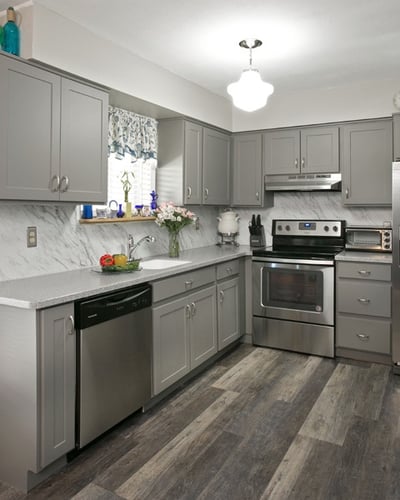
Not sure whether your current hardwood floor should stay or go? Schedule a FREE in-home design consultation with Kitchen Magic to discuss your options.
Want to learn more about how to find the best flooring for your kitchen? Check out these related articles:
- How to Match Your Countertops, Cabinets & Floor
- Which Kitchen Floors are the Most Durable?
- 5 Types of Kitchen Flooring
- Which Kitchen Floors are the Most Sustainable?
- Do I Have to do My Kitchen Floor before Refacing?
- Would It Be Weird if My Countertops and Floor Were the Same Color?



